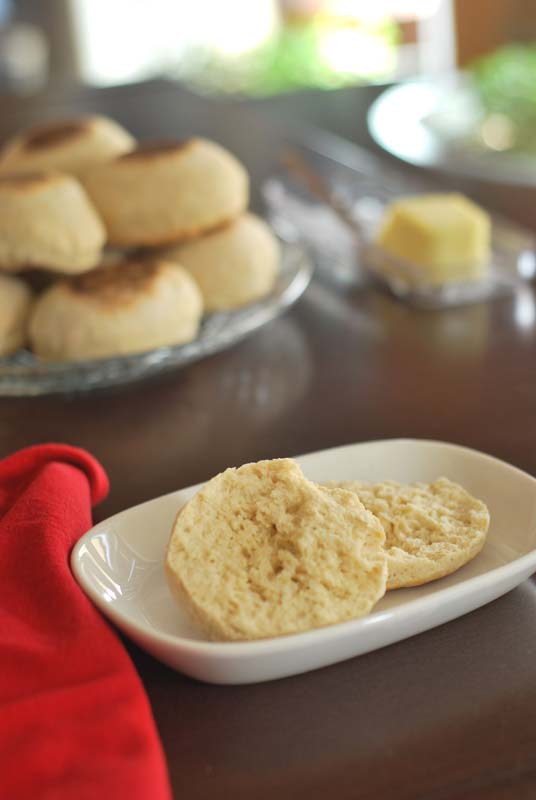Week Twenty-Nine: African Breads
The bread for today hails from Botswana, a country of cuisine unique in the Southern end of Africa. Covered mostly by the Kalahari Desert, wheat doesn’t exactly grow well there; but bread made with imported wheat has found its way onto the Botswanan table, alongside the traditional seswaa (pounded meat) and variously-prepared mopane worms (oh, yes).
It’s a strange name, but don’t let it fool you – these are more familiar than you might think. Diphaphata (dee-pah-pah-tah) are actually prepared in a very similar fashion to English muffins, though they are not entirely alike. Both are cooked on a flat griddle or pan, but diphaphata lack the characteristic tang of an English muffin, as well as the trademark “nooks and crannies” found in a split English muffin.
They end up with a similarly soft crust, and tender interior, but diphaphata are denser inside, and more bready. Additionally, they are much, much faster to make. This may or may not be a benefit to you, weighing the improved flavor of a long rise, versus the time saved. (If you make these in the morning, that might just be a no-brainer, especially if no one’s made coffee yet.)
I’ve not been able to find any images of what diphaphata are supposed to look like, but it seems to me that the typical translation of the word – “flat cakes” – is quite the misnomer. I didn’t exactly roll these out to wafer-thinness, but they puffed up so much they were nearly round! They were very pretty, especially when all stacked up on a plate, but I certainly wouldn’t call them “flat”. Make of that what you will.
Every bit of information I’ve seen on these breads (it wasn’t much) indicates that they’re meant to be eaten with meat, or some sort of main dish. Perhaps it’s a cultural bias in me, equating these with English muffins after all, but these somehow seem like a breakfast food. The texture would certainly not be out of place on a dinner table, and would probably be a lovely addition. But these were quite fast to make, and tasted so good toasted with just butter and honey, that I would serve them for brunch in a heartbeat.
These breads are a bit dense, but somehow still fluffy, from the use of baking powder. This airiness also gives them a slight “nook and cranny” texture when pulled apart or split with a fork (rather than cutting with a knife), just perfect for going crunchy under a broiler, and for catching rivulets of melting butter. They have a mild but pleasant flavor that would definitely not overpower any food you choose to serve them with. The soft texture would do a lovely job soaking up any leftover “plate juices” from a stew-type meal, which are typical in Botswanan cooking. However you choose to serve them, these breads are sure to be a welcome addition to your table, morning or night.
Diphaphata (Flat Cakes)
Adapted from Extending The Table, by Joetta Handrich Schlabach
Makes about 15
12 ounces (about 2 2/3 cups) unbleached all-purpose flour
5 ounces (about 1 cup) white whole wheat flour
4 teaspoons baking powder
1/2 teaspoon kosher salt
1 tablespoon sugar
3/4 cup milk, at room temperature
1/2 cup water, at room temperature
1. In a large bowl, whisk the flours, baking powder, salt, and sugar together. Add the milk and water, and stir until a rough dough forms. Turn the dough out onto a work surface, and knead until smooth, about 1 to 2 minutes. Flatten as much as possible, and cover loosely with plastic wrap. Let rest for 10 minutes.
2. Using a rolling pin, roll the dough out to 1/4 inch thick, adding only as much flour as needed to prevent the dough from sticking. With a round cutter, cut as many rounds as possible, and set aside. Gather the scraps together. Knead briefly to combine the scraps, flatten slightly, and cover loosely with plastic wrap. Let rest while cooking the first batch.
3. Heat a heavy nonstick pan over medium heat until hot. Add as many pieces of dough will fit in the pan without touching, and immediately turn the heat down to low or medium-low. Cook until browned and puffed, about 7 to 10 minutes. Flip over, and continue cooking for another 6 to 8 minutes, or until browned. Remove to a wire rack to cool. Repeat with remaining dough.
Notes:
1. If you can’t find white whole wheat flour, just substitute an equal amount of regular whole wheat flour, or additional all-purpose flour. I liked the slightly rustic characteristic of the white whole wheat flour, which has the added benefit of acting more like regular all-purpose flour in baking.


The breads looks lovely. You’ve got a nice site… good bakes 🙂